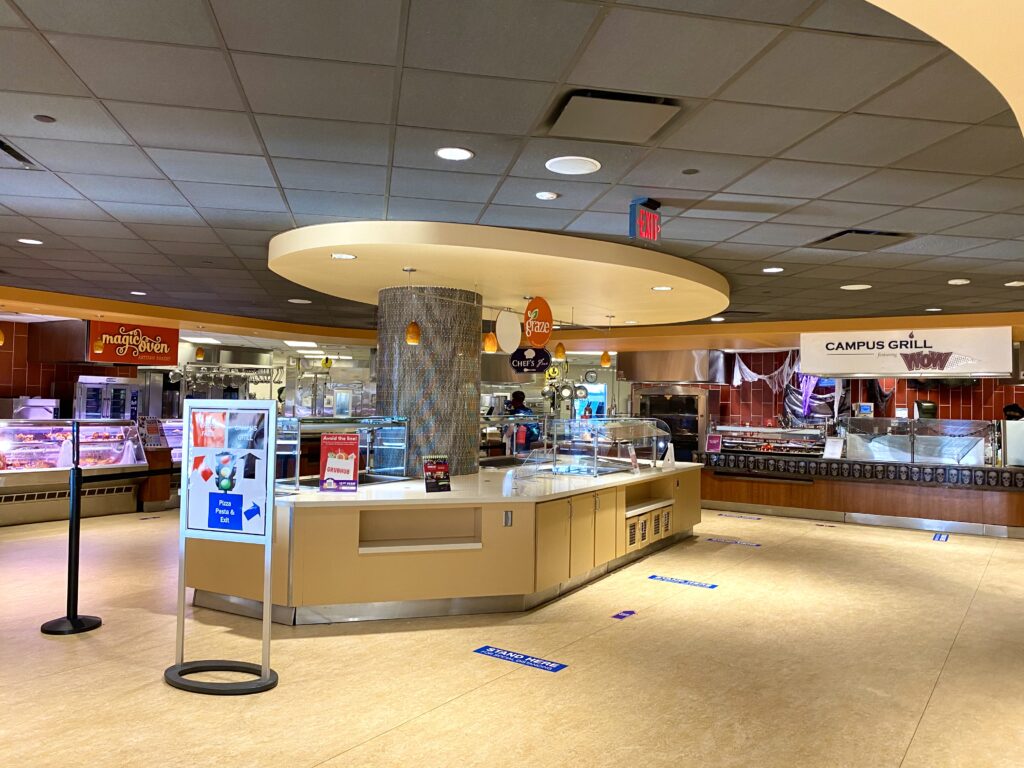UMW Dining is experiencing severe staff shortages
3 min read
Some stations are only open for one meal a day. | Unger / The Blue & Gray Press
by JOSEPHINE JOHNSON & JACLYN LEDOUX
News Editor & Staff Writer
The University Center’s dining facility is experiencing severe staff shortages. As a result, not all food stations are being fully utilized and they’re relying on single-use dishes and utensils.
“The COVID-19 situation has caused a global, devastating shortage in labor as well as very serious interruptions in the supply chain,” said Rose Benedict, unit marketing manager for UMW Dining Services.
UMW Dining has been searching for employees through traditional means but has discovered ZipRecruiter works best for them at this time.
“We have had very, very few applicants,” said Benedict. “Because we have so few workers and our work is very tasking—it’s hard work. Sometimes we’ve hired people and they’ve walked out the same day they came on.”
UMW Dining has consulted with other schools about the staffing issue.
“It is not just our food service—it is food service nationwide and globally,” said Benedict. “We have the same district manager [as William & Mary] and we share notes.”
Some employees are feeling overworked.
“Overall, I feel like there’s not enough staff,” said a UC dining staff member who asked to remain anonymous. “I feel like if there’s enough staff we can grow together. Right now we’re not working together and they’re overworking people.”
Sean Coady, a senior theater and linguistic anthropology double major, believes workers are stressed during his visits to the UC.
“I feel like people are scrambling to get things done, and it just feels like everybody’s a little bit rushed and stressed,” he said. “I feel like if we had more people it would be easier for everybody.”
Some long-term employees have been working overtime.
“We have some of our stalwart employees that have been with us for many years, and it’s really hard to watch them having to take on so much more work,” said Benedict. “We really want to credit them with the work they’ve been doing. Our Executive Chef Peter Stine and our Catering Executive Chef Rigoberto Mendoza, because they’re salaried employees they don’t have to worry about working overtime, but they do. They’re working sometimes 14 to 16 hour days and almost always six days a week, and there have been times when they had to work seven days a week.”
There are also days when hired staff may not show up.
“That’s been one of the hardest things. People just don’t come in and we don’t know they’re coming,” said Benedict.
Benedict wants students to know that their paychecks do not affect their financial aid opportunities.
“A lot of students don’t know, we’re not a state employer,” she said. “Everything you make is yours, you don’t have to worry about it reducing the amount of financial aid that you can get.”
Benedict hopes the dining hall will be able to return to reusable plates, utensils and glassware, but it proves difficult without staff or a utility supervisor.
“If we had more utility staff, we would go back to full china service. It kills us to not be able to have that open,” said Benedict. “We are using compostable, recyclable materials. We’re doing the best we can on that.”


